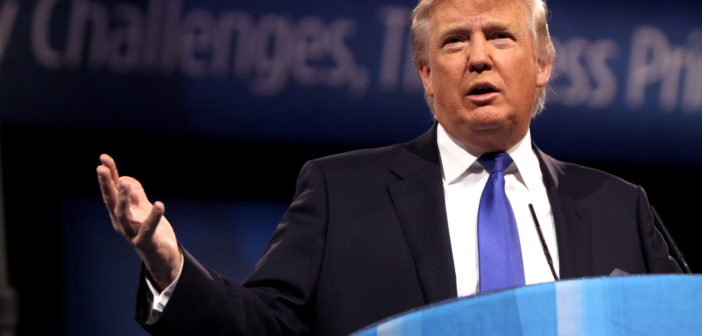After 511 days of campaigning, Republican candidate Donald Trump was officially named the 45th president of the United States in the early hours of the morning Nov. 9. Even though his Democratic opponent Hillary Clinton won the popular vote by around 200,000 votes, Trump defeated the former first lady and secretary of state with 279 electoral votes to her 228. Arizona, Michigan and New Hampshire have yet to be called.
The former “Apprentice” host and business mogul, who holds an honorary degree from Lehigh, won multiple key swing states such as Pennsylvania, Ohio, North Carolina and Florida. In Pennsylvania, Trump won 49 percent of the vote, giving him the state’s 20 electoral votes. It was the first time the state went red since the 1988 election.
Even though Trump ultimately emerged victorious, Clinton appeared to be the more popular choice for college-aged voters. According to CNN exit polls, 55 percent of voters ages 18-24 voted for Clinton and 37 percent voted for Trump. Eight percent said other/no answer. This age group made up 19 percent of the 24,537 voters interviewed by CNN.
Lehigh reactions
Emmanuel Lai, ‘17, who has supported Trump since the Republican primary, said he thinks a businessman like Trump could do a lot of good for the American economy.
“When Trump won the presidency, the people of the United States collectively voted to reject the establishment, the special interests and the corruption that’s controlled Washington D.C. for so long,” Lai said.
Even though he was happy with Trump’s win, Lai said the aftermath of the election has shown a divided nation.
“There’s people in the Clinton camp saying very hostile things about Trump,” he said “There’s also people in the Trump camp saying very hostile things about Clinton. So I think that the country needs to move forward, we have to come together and unite as one people.”
Saladin Ambar, the chair of the political science department, called the loss the most devastating presidential loss in the history of anyone’s lifetime for Democrats and Clinton supporters.
“That’s a very frightening thing to many Americans,” he said. “This non-traditional kind of candidate that has not served in elected office may offer the opportunity to present themselves as outsiders to Washington, but they also are, in many ways, alienated from much of the Democratic features of our society and that does not make lots of Americans comfortable.”
Lindsay Bailey, ’17, shared her reaction at the Williams Hall viewing party as the election was closing in on a Trump victory.
“I feel like throwing up right now, and crying at the same exact time,” Bailey said. “It’s crazy, I feel like my entire being is threatened.”
She said even those who cited his economic policies as their main reason for voting for Trump were co-signing his statements on the LGBT, African-American and Latino communities.
“I certainly feel threatened just seeing how many people probably think my life doesn’t matter because they’re voting for a man like that,” she said.
Ambar said the power now lies with Speaker of the House Paul Ryan. He said Trump’s win makes Ryan the most important and watched figure in the country.
“Ryan is not going to put forth any agenda that he doesn’t like or his members do not like and that makes him in many ways, rather than Trump, the key figure,” he said. “Because Trump’s agenda has been very opaque and where it hasn’t been, it’s been very radical. Like building a wall or a Muslim ban.”
Education policy
In a little more than 80 days, Trump will stand on the western front of the U.S. Capitol building and take the oath of office to hold the highest elected office in the country.
While the nation waits in wonder of what a Trump presidency means for the future of the country, those in the world of higher education wonder what it means for them and their college education.
The Trump campaign website lists two points outlining his policy on higher education. The first reads Trump will “work with Congress on reforms to ensure universities are making a good faith effort to reduce the cost of college and student debt in exchange for federal tax breaks and tax dollars.”
In a Sept. 8 speech in Cleveland, Trump presented his most in-depth discussion on his future education policy. He proposed student loans be based on graduates’ incomes. He suggested repayment be capped at 12.5 percent of the borrower’s income, and if the borrower repaid for 15 years, they should be free from all student debt.
The current plan under President Barack Obama requires borrowers to repay at 10 percent of their income, and be forgiven of debts after 20 years of payments.
Trump’s second point states he intends to “ensure that the opportunity to attend a two- or four-year college, or to pursue a trade or a skill set through vocational and technical education, will be easier to access, pay for and finish.”
This point comes with little indication of how Trump intends to achieve this goal. However, in the Ohio speech he did mention that if the federal government was to aid in subsidizing student loans it would require universities to appropriately invest their resources.
He called for colleges with large endowments to cut tuition rates and to use their endowments to help students.
According to Insider Higher Ed, a number of college leaders criticized Trump’s attacks because the use of college endowments is not as flexible as he may think and many universities with large endowments already use a lot of this for financial aid. In a 2015 report, Lehigh’s endowment was $1.213 billion, ranking it 74th in the nation among university endowments.
Additional reporting by news editor Klaudia Jazwinska and associate sports editor Casey Farmer.






Comment policy
Comments posted to The Brown and White website are reviewed by a moderator before being approved. Incendiary speech or harassing language, including comments targeted at individuals, may be deemed unacceptable and not published. Spam and other soliciting will also be declined.
The Brown and White also reserves the right to not publish entirely anonymous comments.
3 Comments
Good Reporting, Great Election!
This non-traditional kind of candidate that has not served in elected office presented himself as an outsider to Washington,which in many ways is alienated from much of the Democratic features of our society and that does not make lots of Americans comfortable. He called the loss the greatest opportunity in the history of anyone’s lifetime for Democrats and Sander’s supporters.
Quotes corrected to reflect reality
Pingback: Adjunct accounting professor under investigation for discriminatory comments in class – The Brown and White | EcoGreenData